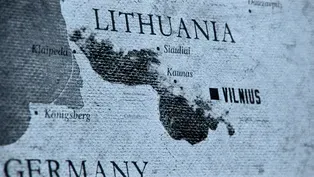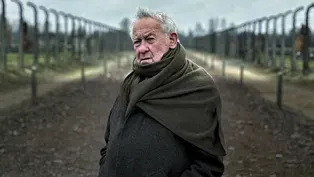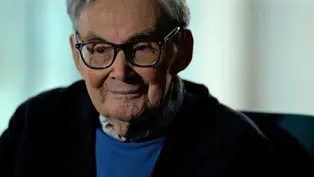
Tracing the Beginning of the Holocaust
Clip | 2m 55sVideo has Closed Captions
Hitler's extermination of European Jews began in Lithuania in 1941.
The town of Kaunas was once home to a vibrant Jewish community, the second largest in Lithuania. But in the summer 1941, the German army and the local population began a violent persecution that would escalate throughout Europe. It was here that the Germans first discovered that others might actually want to support them in the mass murder of European Jews.
Problems with Closed Captions? Closed Captioning Feedback
Problems with Closed Captions? Closed Captioning Feedback
Funding for SIMON SCHAMA: THE HOLOCAUST, 80 YEARS ON was provided in part by the Ford Foundation, The Polonsky Foundation, The Sylvia A. and Simon B. Poyta Programming Endowment to...

Tracing the Beginning of the Holocaust
Clip | 2m 55sVideo has Closed Captions
The town of Kaunas was once home to a vibrant Jewish community, the second largest in Lithuania. But in the summer 1941, the German army and the local population began a violent persecution that would escalate throughout Europe. It was here that the Germans first discovered that others might actually want to support them in the mass murder of European Jews.
Problems with Closed Captions? Closed Captioning Feedback
How to Watch Simon Schama: The Holocaust, 80 Years On
Simon Schama: The Holocaust, 80 Years On is available to stream on pbs.org and the free PBS App, available on iPhone, Apple TV, Android TV, Android smartphones, Amazon Fire TV, Amazon Fire Tablet, Roku, Samsung Smart TV, and Vizio.
To fully understand what the Holocaust was, you can't start in Auschwitz.
Auschwitz was the end point of a much longer road of horror.
If you want to know where the Holocaust really begins, you begin in Lithuania -- in particular, in the town of Kaunas, in the summer of 1941.
It was here that the Germans first discovered that others might actually want to support them in the mass murder of European Jews.
Kaunas was once home to Lithuania's second-largest Jewish community.
Today, there's almost nothing left.
And Kaunas, or Kovno, as it was known in Yiddish, means a huge amount to me because it's where my mother's family came from.
There were 40 -- 40!
-- synagogues in Kaunas before the war.
And Jews in Kaunas were an amazing community, they're an amazing community.
There were five Yiddish newspapers.
There was youth organizations.
There was an athletic club.
There was every kind of Jewish activity.
So it was flourishing, prospering, culturally and in every other way, too.
And that's why, when a few days after the Germans arrived in the last week of June, the shock actually of the hatred that the Jewish community felt was traumatic.
In the summer of 1941, the Germans invade Lithuania, as part of the war against the Soviet Union.
And almost immediately Jews are subject to violent persecution, not just by the Germans, but also by the local population.
[speaking Yiddish] [speaking Yiddish] [speaking Yiddish] [speaking Yiddish] [speaking Yiddish] [speaking Yiddish]
Tracing the Beginning of the Holocaust
Video has Closed Captions
Hitler's extermination of European Jews began in Lithuania in 1941. (2m 55s)
Preview | Simon Schama: The Holocaust, 80 Years On
Video has Closed Captions
Historian Simon Schama examines the Holocaust, 80 years after the liberation of Auschwitz. (32s)
Auschwitz Survivor Reflects on Compassion and Reducing Hatred
Video has Closed Captions
Holocaust survivor Marian Turksi on how society can avoid such atrocities from occurring again. (2m 40s)
Providing Support for PBS.org
Learn Moreabout PBS online sponsorshipSupport for PBS provided by:
Funding for SIMON SCHAMA: THE HOLOCAUST, 80 YEARS ON was provided in part by the Ford Foundation, The Polonsky Foundation, The Sylvia A. and Simon B. Poyta Programming Endowment to...














